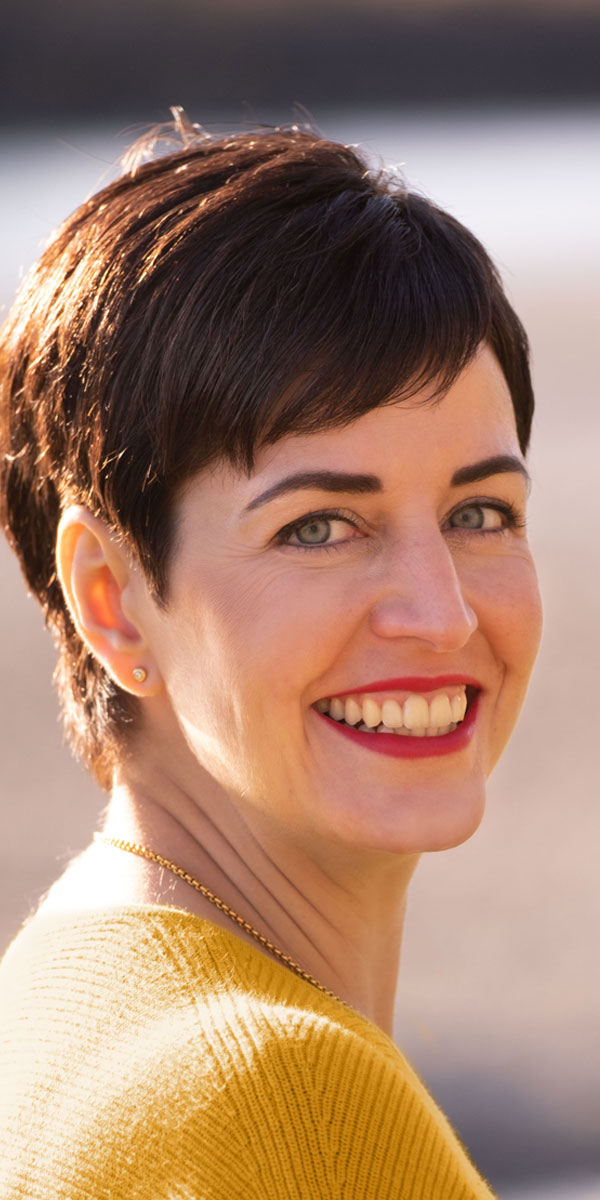
Talk with
Johanna Ahrens
Johanna Ahrens is one of few women in tech with strong media presence. She works for Cisco as Business Development Manager and regularly receives awards for her speaker activity. She is also mum of 3 kids: 8 weeks after each birth she returned to work, fulltime, without external care support for her newborn babies. Her husband takes over. 😉
She developed a tech-career after her education as pedagogue. For me this is a first within the role model interviews for “Coachiba kids & career” because she has profound knowledge regarding the bonding and attachment theory regarding the parent-child relationship.
In the interview we speak about Johanna’s individual life and career model, family roles, career experiences and unconscious bias.
If you haven’t met me so far, Marina, I advise parents and companies when it comes to revolutionizing work with kids! We need parents at work and our kids need competent parents. That’s why I combine expertise for children, with profound business experiences within my company Coachiba. I was manager in the automotive industry and over 7 years KPMG advisory representative. Find out more about myself or my trainings, speeches, and consulting activity.
In my blog I provide inspiration. Role models show their personal ways for balance within their family and business.
Interview
Marina: You have an impressive CV. But your path wasn’t always easy. In previous employments within tech, you have experienced strong prejudice as a female manager and mom. You chose „That’s not what I’m up for!” and left. What have you experienced?
Johanna: It took a lot of strength for me to stand up against the constantly present prejudices against mothers. Totally fancy were statements like:
“You’re coming back right after maternity leave? Are you missing a gene?”
– from a colleague -.“You’re in the office today? I thought moms don’t work on Fridays?”
– again a colleague -.“How can you give up your kids like that!”
– from a family member -.“Well, I couldn’t do that, being with a man who doesn’t make money!”
… by the way, my husband earns very well, even with a reduction of hours in each first baby year.“And who will take care of your children when you go back to work?”
– question in a job interview -.
However I also worked for an incredibly emancipated boss and CEO of the company for 11 years. He never treated me differently just because I was very young, female, a career changer, pregnant or a mother.
On the contrary: he was sincerely happy for my husband and me when I told him the news.
Nor did he take away my position or tasks. He simply asked, “What do you need?” and always kept my husband in mind. This included a larger company car, business class flights in late pregnancy, etc.
Today, I work with both European and global teams and perceive that my specifics, such as “young for a management position, female, mother, career changer”, don’t matter.
I enter an appointment and the only thing that counts is my professional competence. I am no longer “tested”. This happened to me in over 100 IT projects in 4 out of 5 introductory appointments.
It is also interesting that I do not experience underlying messages in European and international projects. Nobody gives me a side blow if I am 1 minute late to the meeting like “Well, didn’t your hair sit right?”. No one drops hints like “Do you even work on Fridays?”
They don’t deduct any skill points from me on the professional side either. In my position, I need flexibly assembled teams. People have to “work for me” who are not directly subordinate to me in disciplinary terms. Here, too, I don’t experience any reservations about me as a person or any stereotypical role concepts.
Marina: Unfortunately, particularly mothers take such experiences to draw themselves back from their career. Unwillingly the unconscious bias plays an important role within this decision. What makes the difference that such experiences do not become the breaking point of an individual career?
Johanna:
In the case of my own socialization, I simply lacked role models of any kind. Having grown up “in the East” (meaning East Germany, the former GDR), these classic stereotypes didn’t exist at all. So, when I became pregnant, it simply didn’t occur to me that I would suddenly be the one staying at home or being part-time employed.
It was only over the months and years that I realized that my husband and I had chosen a very unconventional path. For us, the role swap wasn’t special; it was our environment that made it special. I believe that if you don’t have these unconscious thought patterns in your head, you also encounter your environment and especially your employer differently.
I was not always sensitive in the subject of equality because, as mentioned, I had an extremely equal-thinking boss. However, the world does not only consist of such behaviour. And it was only as I gradually hired more women that I realized that “we” are actually confronted with many unconscious biases that I myself had not been aware of for a whole decade. I had already subconsciously adapted to a “rather male” way of thinking.
Marina: So true. That clearly highlights the need to acknowledge the existence of your unconscious bias.
One could argue that you have simply swapped the classic family roles. Still one of you is home and looks after your children. In that sense the disadvantages, that women experience, just moved towards your husband.
Johanna: It’s not quite that single-sided. My husband has always worked, just adapted when he is mainly in charge of the children. He completely reorganized his professional activities and aligned them with me and the family needs.
When he travels for work, I take vacation on such days. He works a lot on weekends, which means that I take care of our three children. Or I invite family members who live further away to stay with us.
And let’s be honest: If my husband wants to work more, once the children go into daycare, he won’t have the classic obstacles: No one denies his ability to deliver professionally on a project just because he is a father of three. No one asks him how he plans to coordinate a new project and three children.
So it’s only logical that we swapped roles!
Marina: I would really like to know how your family arrangement developed! How did you find this model for all of you? At least here in Germany, often the parent who earns less, mainly the moms, take the much longer parental leave.
Johanna: In our case, my husband also earned more than I did.
But also I love my job very much and really wanted to continue my career development. Even though this desire may have cost us money overall as a family.
In addition, “parental time” has not meant a professional or financial standstill for my husband. Even with a baby, he can continue his work; he has more flexibility than I do.
Marina: You told me working with the company of a baby or child was never an option for you. Unlike some other interviewees I have had so far. When you are at work, your work has 100% focus. Can this be turned vice versa? When you are at home your sole focus is your family?
Johanna: The answer is “no” straight away. My role requires creativity, new solutions, new processes, unique concepts. That doesn’t work squeezed into 9-5. I’m happy to meet colleagues from the U.S. after 8 p.m. virtually. Not because I have to, but because I want to.
I also often brainstorm on a presentation or a tricky problem at night when the rest of the gang is asleep. Because I enjoy it, not because someone expects me to come up with a solution the next day.
Marina: You regularly take part in international events and meetings. So, is the rest of your family home alone in this time?
Johanna: That’s another special aspect of our life. No, I never travel alone.
When there’s a business-motivated trip outside of Germany, we all travel together. While I’m attending an event in Vegas, my husband enjoys the day with the kids by the pool.
Of course, this model is expensive, because we pay the travel costs for my husband and the children ourselves. In return, we often can’t afford any other vacation. Nevertheless, we have chosen this life model and stick to it. This also applies vice versa. When my husband travels for a longer period of time for work, I take vacation and manage the kids, wherever his business trip takes us.
Marina: How do your kids affect your professional lives? What are your key learnings when it comes to kids & career?
Johanna: It takes a lot of discipline to follow this path. For example, we have a razor-sharp separation of all tasks that come up in our family. The entire process lies with one person, there is no separation of mental load and execution.
In order to do that, you have to be able to let go. It’s not always easy as a mom when the Paediatrician hisses at you because you don’t know your own kids’ vaccination status. My husband knows it by heart … but that doesn’t count for the doctor.
It’s important to let your partner solve “his” issues alone and give up control. I never know what we’re having for dinner. I don’t agree at all with the choice of the family car. I would never invest so much time in taking care of the garden fish.
But that’s exactly the point: these areas are owned by my husband. And I absolutely stay out of it. This also applies vice versa, of course.
If you don’t show this discipline, then you use up too many resources with coordination and negotiation. We prefer to invest this time in being with each other as a couple.
Marina: I really delve into possibilities to focus on children whilst developing and maintaining a career path as a parent. In my experience most solely business-driven solutions lack the connection to the needs of children. However, companies who want to hold successful parents will also need to provide this perspective.
You have profound experience in child development and parental attachment and bonding. With your background I am particularly interested in your vision of compatibility for work / career with a family.
Johanna: There is one main problem: people, both men and women seem to think, that women are somehow better suited to raise children. I think newborns, babies and children need a strong and present primary caregiver. Gender doesn’t matter.
Delivering babies and breastfeeding will continue to be “women’s work,” but everything else? Can be done by anyone who is willing to contribute the time and mental resources.
Children need bonding, reliability, guidance, love. Why shouldn’t the father provide all this? There is no disadvantage, neither medically or sociologically, for children who have been raised by a mentally strong and present parent who was not the biological mother. On the contrary, there are studies on how the male brain restructures when the man experiences a strong involvement in pregnancy and babyhood.
Marina: What would parents and companies need for real compatibility of family and work requirements?
Johanna: That’s a complex question! In our model my husband is the real compatibility component. He looks after the babies, he is always reachable for the daycare facility, he drops everything if a child is home sick or there’s no childcare due to a lack of staff.
What has been insanely helpful to me personally, is the ability to work from home. And I don’t mean taking care of a child whilst I’m at work, or turning on the washing machine at lunchtime, or opening the door for the package delivery guy. My husband does all that.
But eliminated travel time gives me two extra hours every day. These two hours in stressful city traffic benefit neither the employer nor me. On the contrary, I can use this time for late or early meetings.
I also gain quality of life because I can have breakfast with my children in the morning. I see my husband plus baby or toddler every now and then at lunchtime. I’m at home when my kids come home from daycare, even if I disappear back to the computer afterwards.
Working from home takes away a lot of guilt. Even though I still miss my children’s first steps and their first word is “daddy”. That’s just part of letting go. And when I do feel sad about these missed moments, I reconsider. Because life is great for my children, for them it doesn’t matter whether their first word is “mommy” or “daddy”.
Basically, I don’t demand from others to make my life beautiful. This also applies to the companies I work for. The only thing I ask is for people to be open to me and my lifestyle. That I am not denied career opportunities, for example, “just because I am a woman or a mother,” without taking our particular life model into account. Life models must and will become more colourful. And to do that, we have to put an end to old role model expectations.
Marina: As your husband is your compatibility component, I would really like to hear his perspective. Which are his biggest challenges and how can he overcome them?
And here it is, his comment, even though he prefers to comment anonymously.
My life motto: “Do whatever you want, but take responsibility for it” – even, or especially, when it is not easy and requires a lot of energy.
For me, there’s no alternative to having children and a family, that was a conscious decision. However, in retrospect I can say that the impact of this decision cannot be known in advance. There are many positive things and many beautiful moments, but it can also be exhausting and brings you to limits that you didn’t even know were possible.
“Family” doesn’t have a standby mode. So, taking responsibility for it also means taking a step back from yourself, your career and your own projects, and being there for your family. Avoiding that would be irresponsible to my partner, who would then have to do my part of the job. Besides, I would miss the time when my children grow up. And you can’t make that much money to make up for it.
Marina: Does this mean, you personally think, that focus on a fulltime career of both parents is not manageable?
“Basically, that’s it. With children, things just don’t stay as they are. If it does remain as it is for one parent (i.e. before kids), then everything will change for the other!”
Thank you, Johanna, for sharing your personal insights and experiences!

If you, yes YOU, have got any questions regarding improvement potentials for parents at work and at home, feel free to drop me a message.









